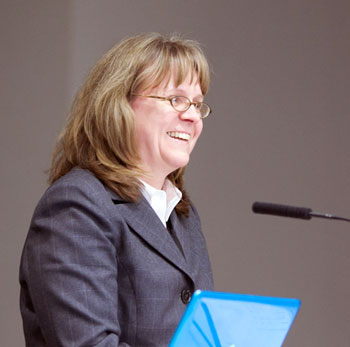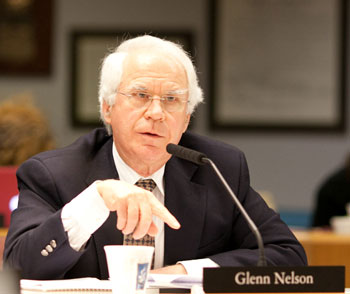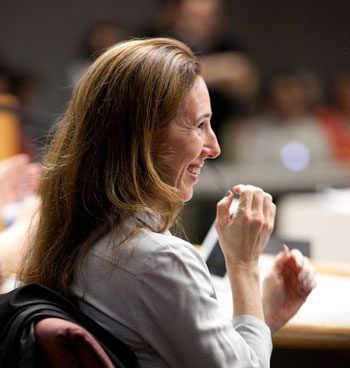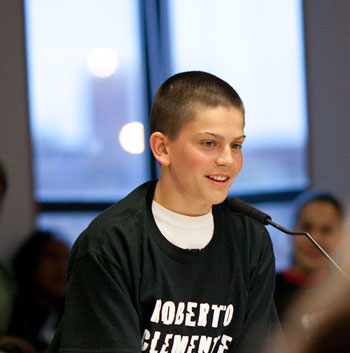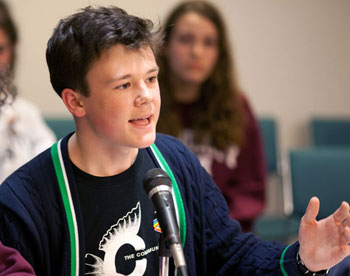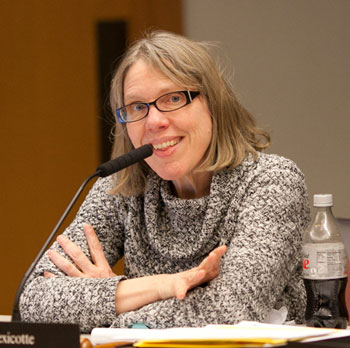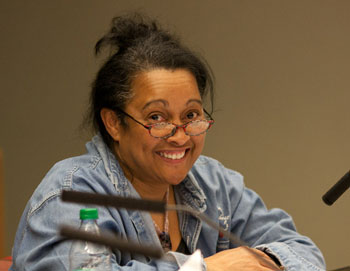Smaller Deficit to Inform AAPS Budget Talks
Ann Arbor Public Schools board of education regular meeting (April 10, 2013): Editor’s note: Since this board meeting took place, the board of trustees has held a study session – on April 17. And several community meetings on the budget have taken place. The Chronicle anticipates being able to provide coverage of those events as well.
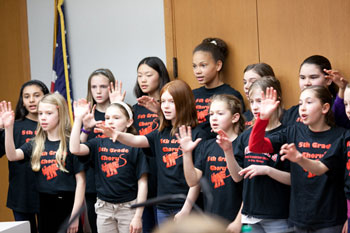
Wines Elementary 5th grade chorus performed during the board’s April 10, 2013 meeting. (Photos by the writer.)
At the meeting, the board of trustees was presented with a revenue projection report that now forecasts just a $8.67 million deficit for the 2013-14 school year, compared to the previously-projected $17-20 million shortfall.
The trustees were pleased that the numbers were “less bad” than was initially projected, but they acknowledged that the remaining $8.67 million was still a daunting amount to cut. Concessions totaling $3.4 million have already been made by the Ann Arbor Education Association (AAEA).
The board heard extensive public commentary on several possible budget cuts.
The board also finalized policy changes that had been brought forward by president Deb Mexicotte. The policy changes include placing time limits on board meetings, imposing time limits for item discussions, and changing the board’s committee structure.
After some discussion, the trustees settled on their previous standing committee structure of a planning committee and a performance committee. They also voted to add a governance and an executive committee.
Additionally, the trustees approved a purchase request for software licenses in the amount of $232,486. They also heard a first briefing of the spring grant awards.
2013-14 Budget: Revenue Forecast
District superintendent Patricia Green introduced the revenue forecast presentation by saying the district administration was following a different approach this year to presenting the budget. Revenues and expenditures would not be presented at the same meeting. The expenditure side of the budget will be presented at the board’s April 24, 2013 meeting.
Emphasizing that revenue was not a “static item,” Green said the administration has been working throughout the year to bring forward the best projections. The most recent revenue projections show an increase in revenue, due to local reimbursements changing, as well as some money coming in from the state. Green again thanked the bargaining units for helping to cover the budget gap the district is facing, referring to the $3.4 million in concessions made by the Ann Arbor Education Association (AAEA) in March.
2013-14 Budget: Revenue Forecast – Presentation
Nancy Hoover, director of finance, walked the trustees through the revenue projections for the 2013-14 school year.
Hoover first gave the details of the governor’s budget proposal, which includes the continuation of the Michigan Public School Employees Retirement System (MPSERS) offset funds, a relatively constant MPSERS contribution rate of about 24.5%, and additional money allocated to fund MPSERS unfunded liability. There will be no change in the district’s foundation allowance [the amount the district receives per student] of $9,020. Best practices funds are expected to continue at a reduced level of $16 per student, and performance grant funds of up to $100 per student are expected to continue. AAPS received $40 per student in 2012/13.
Hoover then explained how foundation allowances are determined. She showed a history of funding allocations AAPS has received from the state since Proposal A was adopted. For the 2013-14 year, the district will be receiving less money per pupil than in 2001-02 when the allowance stood at $9,034. Considering the nominal foundation allowance minus MPSERS contribution, and after adjusting for inflation, measured in 2002 dollars the district will receive $5,801. That is a change of -30% from 2002 in adjusted net.
The general fund revenue for 2013-14 is projected to be at $180.59 million. This takes into account the foundation allowance, local sources of money, state sources of money, and interdistrict and financing sources. With total expenditures at $192.66 million and $3.4 million in staff concessions, the total net expenditures is $189.26 million. That leaves $8.67 million in remaining budget reductions required to balance the FY 2013-14 budget.
2013-14 Budget: Revenue Forecast – Board Reaction
The trustees praised Hoover for the conciseness and the content of her presentation. Andy Thomas said it was “informative” and said it “cut to the chase.” Glenn Nelson thanked Hoover for a well done report that made it clear where revenues came from. He and Green both recognized the work Hoover has done as she stepped up after Robert Allen, former deputy superintendent of operations, left the district at the beginning of March.
In an effort to explain the difference between the $17 to $20 million deficit the board had been prepared for and the $8.67 million deficit Hoover presented, Thomas walked through a brief history of the past year. In the summer of 2012 and in anticipation of a big deficit, the board asked the administration to move up the budgeting process. In November of 2012, the board was presented with the first draft of the budget. At that time, the board was told that the revenue projections included a lot of unknowns. Based on best information at the time, which included a projected increase in MPSERS rate and assumptions that the state wouldn’t continue the best practices allowance or the MPSERS offset, a $17 million deficit was projected.
That deficit has since dropped because of a roughly $2.2 million MPSERS offset, a best practices allowance of $260,000, and the MPSERS rate holding steady rather than increasing – which staved off a $2-2.5 million increase. The concessions made by the AAEA will also save the district $3.4 million in the next year.
Nelson noted that the special education reimbursement is substantially increased from previous projections, which helps the budget picture. WISD has increased its estimate of the special education reimbursement as property values have begun to stabilize. He emphasized that because the community supported a special ed millage, the district is now in a position to realize some gains as the local economy improves.
Several trustees reiterated that although the budget picture is looking “less bad” – by about $5 million – the final figure of $8.64 million is still a very large amount that needs to be cut. The notion that there was now a rosy picture of the budget, trustee Christine Stead said, needed to “be shut down right now.” A significant gap still needs to be addressed. Trustee Irene Patalan was pleased the report contained a “good surprise,” but she didn’t want to lose track of what still needs to be done.
Stead pressed for some worst-case scenarios. To be able to plan for some risks, she asked that ranges be considered when looking at student enrollment [currently, enrollment is projected to remain flat], as well as possible decreases of funding for best practices and MPSERS offset. She said she wanted to make sure the district did not have another second quarter surprise like it did this year.
Trustee Simone Lightfoot questioned whether the $16 per student for best practices was really worth the hoops the district was jumping through to achieve it. The money for best practices from the state has steadily declined from $100 per student in 2011-12 to $52 per student in 2012-13 to $16 per student in 2013-14. And while the funding has decreased, school districts are asked to do more in order to qualify for the funds. Lightfoot wondered if the district would spend more than the $260,000 they will receive in order to comply with the eight requirements. Hoover assured Lightfoot that compliance with the requirements wouldn’t be difficult.
After board president Deb Mexicotte thanked Hoover for the report, she said she was pleased that the number was not as bad as had been anticipated. Yet there were cuts totally nearly $9 million that needed to be made, even after labor concessions. While “the community is behind us,” it is still a daunting task, she concluded.
Outcome: This was an informational presentation. Expenditures will be presented at the April 24, 2013 meeting. After that, the board will begin deliberations on how to balance the budget.
2013-14 Budget: Community Dialogues
During the president’s report, Mexicotte gave a brief overview of the two community budget dialogues already held by the board. The focus of the dialogues, Mexicotte said, is to hear the community’s vision for the district and to figure out “how best to meet that vision with the constraints of the budget.” She then asked the trustees who also had attended the community budget dialogues – Nelson, Thomas, and Stead – to share their initial impressions of what they were hearing from the community.
Nelson first explained the format of the dialogues. After the trustees introduce themselves and give a brief overview of the budget deficit the district is facing, the community is given the opportunity to ask questions or comment. The trustees are taking notes on the suggestions and concerns that are being expressed so that information can be shared with the board as a whole. Nelson, as board treasurer, and Mexicotte, as board president, will be present for all four dialogues.
Both Stead and Nelson were impressed with the community’s desire to work towards increasing revenue, whether from private donations or an enhancement millage. Stead said she was proud of seeing “our entire community coalescing around Ann Arbor Public Schools.” Thomas said he was struck by the fact that people are struggling with a possible change to the identity of AAPS – a district that has rejected a one-size-fits-all model of education. What was now being threatened, he said, was the ability to offer a wide variety of opportunities. And so, Thomas concluded, a countywide enhancement millage and private giving will be all the more important. He suggested supporting the Ann Arbor Public Schools Educational Foundation (AAPSEF).
The remaining two dialogues were scheduled for Tuesday, April 16 at Slauson Middle School from 7-9 p.m. and Saturday, April 20 at Scarlett Middle School from 9-11 a.m.
2013-14 Budget: Public Commentary
Sixteen members of the public spoke to express their support of programs the board has identified as possible reductions.
2013-14 Budget: Public Commentary – Community High
The board is considering eliminating block scheduling at Community High School for a savings of $300,000. [Some classes are scheduled for two-hour blocks.]
After sharing his family’s initial disappointment with AAPS after moving from Baltimore, Jakub Simon said his daughter was “no longer wasting her time” in school since she made it into Community High. Block scheduling and forum were important to the integrity of Community, Simon maintained, and are characteristics of high performance schools. He said the district should learn from those aspects of Community education, not cut them. He asked that the board and the superintendent look into setting up a system for parents to donate to the schools, as was suggested by Steve Norton at the previous evening’s community budget dialogue.
Sandra Finkel, Community parent, argued that block scheduling was part of what made Community such a rich, productive learning environment. She said it would be a “terrible mistake and very short sighted” to damage what makes it so exceptional.
Julia Karr, Community senior, pointed out that Community brought many students back into the district, which brings in additional funding from the state. If the structure of Community is cut, she said, a major draw to AAPS would be eliminated.
2013-14 Budget: Public Commentary – Roberto Clemente
The board is considering restructuring Roberto Clemente Student Development Center to achieve targeted savings of between $127,379 and $348,677. Students, parents, and Clemente teachers spoke in favor of maintaining the program.
Clemente students, past and present, spoke about how their lives have changed since attending the program. Alexzandra Botello said she didn’t know what her future held if the school closed. She was just focused on graduating on time. Camae Abrahams said she was the “poster child” for why not all students can be successful at the comprehensive high schools. At Clemente, she was taught how to apply herself and how to focus on her education, something she said she wasn’t taught at Pioneer.
Tommy Doyle said the large class sizes at Pioneer would not benefit his education. He asked the board to visit the school to “see how great of a program” it was. Stanley Campbell and Harry Hampton, both past Clemente students, spoke how Clemente was a family and how they were still part of that family. Hampton asked the trustees to do whatever they had to do to keep the program alive.
Parent Evette Meckl maintained that “no child left behind” was a false statement if the board decides to restructure Clemente. She said she couldn’t comprehend how the program would function when housed in Pioneer. She pleaded for the board to “not fail the kids now.”
Longtime Clemente teacher Mike Smith said that since he addressed the board at the previous meeting, he had looked at some statistics on Clemente students: 88% of the students are economically disadvantaged and 42% were special education students, yet the program had a 88% graduation rate. The program’s graduation rate is comparable to the graduation rate of Huron High School. He again asked why the stakeholders of Clemente were not invited to the discussion of what to do with the program.
Lexanna Lyons, longtime educator, said that while AAPS was not perfect, she recognized the district tried to do the right things. And the right thing now, she said, was to keep Clemente “as it is,” because students were finally having a remarkable measure of success there.
Parent Chris Miller expressed concern over moving Clemente students to Pioneer, given that many Clemente students have been referred from Pioneer to Clemente. She wondered if the cracks those students fell through at their comprehensive high schools have been assessed. She asked if we were really “such elitists that we have no space for the disadvantaged.”
Tera Cole, Clemente parent, read a glowing recommendation letter written for her son who had recently been accepted to the University of Detroit-Mercy school of engineering. She said he was able to thrive and do well at Clemente. She asked the board to see the difference the school was making for students.
Kathleen Ardan, Clemente teacher, spoke about the design of the building where the program is currently housed. It has small class sizes and no nooks where students can hide. The school was built to suit the program and was “designed to help us do what we do best.” She said she couldn’t imagine other uses for the building if the program was moved out.
2013-14 Budget: Public Commentary – Theater Guild
The board is considering cutting all district funding for theater for a savings of $200,000.
Alesia Aldridge spoke in support of theater programs by sharing the story of how her life was impacted by Pioneer Theater Guild. She said it changed her life and she credited it for shaping the “strong, independent” woman she is today.
2013-14 Budget: Public Commentary – General
Barbara Malcolm took issue with several things the trustees were doing that she felt were disrespectful. Trustees who worked on their computers during public commentary and budget dialogues “put together at the eleventh hour” were signs of “disrespect and disregard.” If their motives were sincere, she said, budget meetings would have been happening all year long. She questioned the vetting process used by the board in their superintendent search. She asked the trustees to disclose if any performance bonuses were given out the administration.
Sophie Grillet acknowledged the difficult decisions needed to be made by public schools. She said that the variety AAPS offers is part of what makes it great. She wondered that if programs are cut, might they end up with something too small to attract anyone. Grillet said that the real question when talking about programs might not be “how are we going to cut it, but how are we going to fund it?”
2013-14 Budget: Public Commentary – Clarifications
The board includes a slot on its agenda called “clarifications” for responses to public commentary.
Green explained that no decisions have been made on the budget at this point. She said that what the administration has been doing is costing out programs and has not yet made recommendations.
While it is not usual for trustees to respond to topics brought up in public commentary, Thomas said he wanted to address some misconceptions about the board and how it does business. Addressing Malcolm’s statement about the trustees working on their computers during public commentary, Thomas explained that board has shifted to a paperless system, and uses laptops during the meetings to access the agenda, take notes, and refer to documents.
Thomas also asserted that trustees did a “conscientious and thorough job” of vetting superintendent candidates before hiring Green. While a snowstorm prevented onsite visits of the candidates’ school districts, he and trustee Susan Baskett spent a day of checking references and conducting a series of telephone interviews with people in the districts.
2013-14 Budget: Association Reports
Five associations are invited to make regular reports to the school board: the Black Parents Student Support Group (BPSSG), the Ann Arbor Parent Advisory Committee for Special Education (AAPAC), the Parent Teacher Organization Council (PTOC), the Ann Arbor Administrators Association (AAAA), and the AAEA. The Youth Senate is also invited to speak once a month, alternating with representative groups from each of the high schools.
At the April 10, 2013 meeting, the board heard from AAPAC and student representatives from Community High School. Both presentations addressed the issue of the budget.
Rianna Johnson-Levy and Cooper DePriest, Community students, spoke about the opportunities provided at Community. Johnson-Levy asserted that Community sends students out into the world with a phenomenal education, one that teaches the whole person. She said that she herself “was not an exceptional student but was an average student who had exceptional opportunities at Community.” Johnson-Levy was later recognized by Green as a National Achievement Scholarship Program winner.
DePriest highlighted several of the programs Community offers that helps students grow outside the classroom. He said that CHS students have the ability to effect change in the community around them, and that is encouraged by the staff. He said he hopes Community remains a school that educates the whole student.
AAPAC representative Ann O’Connell drew attention to the possibility of the elimination of targeted resource rooms without collecting data or analyzing it to show the effectiveness of the resource rooms. She suggested expanding the existing targeted resource room model to the handful of additional schools needed to provide appropriate services to students transitioning out of preschool and into kindergarten.
AAPAC also invited the trustees and the public to their next meeting, on May 6 at 7 p.m. at Tappan Middle School. At that meeting, Green and SISS director Elaine Brown will be sharing information related to the SISS action plan changes being implemented for the 2013-14 year.
Board Policy Changes
At the Mar. 27, 2013 board meeting, Mexicotte had introduced some policy changes related to the issue of meeting time limits, the re-creation of standing committees, and the timing of organizational meetings. At the second briefing, held at the April 10 meeting, Mexicotte returned with “fairly substantive changes” made based on the trustees’ previous discussion.
She had brought back the policy language for the previous standing committees of performance and planning, so it could be compared with the suggestions she had made for committee structure: student achievement; and budget & finance. She also included a policy that was written in response to some trustees’ request for additional time limits for agenda items. Mexicotte also noted that any subcommittee would be proposed to fall under Michigan’s Open Meetings Act, which meant that it needed to be publicly posted and minutes be taken.
The trustees discussed each policy change as Mexicotte brought them forward.
Policy Changes: Policy 1110 – Selection of Officers and Length of Term
While nothing in policy 1110 was proposed to be changed, Mexicotte drew the trustees’ attention to it because it indicates that the executive cabinet of president, vice president, treasurer, and secretary is to be elected at the organizational meeting.
This matters because board of education elections now only occur on even numbered years in November, when they had previously been held every year. It factored into subsequent board discussion on other board policies.
Policy Changes: Policy 1200 – Meeting Type & Notice
Policy 1200 was reviewed for time limitations language, an examination of the timing of the organizational meeting, and the elimination of committee of the whole (COTW).
The policy was rewritten to reflect a five-hour time limit for regular board meetings and a three-hour time limit for committee meetings. While most board members felt that five hours for a regular meeting should be enough, they asked to shorten committee meetings even more to two hours. Stead said that if they work on agenda management, they should be able to work to a two-hour target for committee meetings. Baskett was the only trustee who did not agree with shortening committee meetings from three to two hours.
Lightfoot, who was absent from the meeting when the initial discussion took place, disagreed with the need to place time limits on meetings. She maintained that committee members should be able to have the option to extend their meeting, if the conversation warranted it. She asked if there could be some way to give committees flexibility with their time limits. Mexicotte said they could have a voting process to allow for a longer meeting.
The organizational meeting has been “the first meeting after newly elected board members take office.” Now that the election cycle for the board has changed to a biannual election, the trustees discussed if they wanted to change the frequency of the organizational meeting and address when officers were elected.
At the organizational meeting, officers are elected, committee appointments are made, and associations are approved. If the board chooses to do nothing about the policy, Mexicotte said, everything would be done on a biannual basis.
Patalan and Nelson were in agreement that they wanted an organizational meeting every year. Patalan said that it was the state, not her, who chose the every other year election cycle. Nelson said he liked having the possibility of annual reorganization. Mexicotte said that signing up for a two-year committee chair position might be a bit daunting, and an annual meeting might offer more flexibility.
Thomas did not see a need for an annual organizational meeting. If a vacancy occurred or if an officer wanted to resign, he said, mid-year elections could be held.
Lightfoot, while comfortable with some aspects of board organization occurring every two years, was concerned that they could miss some things if an organizational meeting was held once every two years. She asked what could be done if there was dissatisfaction with the service of one of the officers. Mexicotte responded that the board can always make the motion to remove an officer.
Because the board was moving towards standing committees, the language related to the committee-of-the-whole (COTW) was struck from the policy.
Outcome: The policy was rewritten to show that that the standing committee meetings will strive to be no longer than two hours. Mexicotte will bring forward a rewrite of the policy that indicates the organizational meeting will occur on an annual basis. The altered policy will be brought forward for a second briefing at the next regular board meeting.
Policy Changes: Policy 1220 – Meeting Agendas
Policy 1220 was reviewed for language removing the COTW and allowing review of items in a standing committee prior to placing items on the regular meeting agenda. The board spent significant time reviewing new language outlining the process for setting time limits on agenda items.
Mexicotte also introduced imposing time limits on discussion for agenda items during regular meetings. When Lightfoot asked why they would constrain and “stifle” themselves in their discussion, Mexicotte said that she has heard concerns from the public, other board members, and the administration about the length of meetings. If trustees gave themselves a time constraint, she continued, it would drive them to be more succinct and more to the point in their discussions.
Thomas mentioned that the items brought forward at regular meetings will have been vetted in committee beforehand, so there should be less need for extensive discussion at the board table. Including himself in the criticism, he said that trustees have not been very good at controlling themselves when speaking. Baskett noted that if they were placing time limits on the discussion, they should also expect presentations from the administration to be much more succinct rather than “regurgitating” the information from the packets.
Discussion was capped at 15 minutes per agenda item, with the option of allowing one extension per item. Nelson pointed out a loophole in which they could vote to suspend the by-laws. Mexicotte agreed that if there was an item of such import that it needed to be discussed for longer than 15 minutes plus and extension, trustees could vote to suspend the by-laws for a single meeting.
Lightfoot again brought forward her concern that the board was not allowing for flexibility. She felt they were “using rules to stifle the conversation.” Even with the ability to extend the conversation with a simple majority, Lightfoot said that she has had a difficult time convincing at least three other trustees to have conversations about the hottest topics. It was not easy or equitable, and instead of having those conversations in an open way, she said, the board was changing the rules.
Mexicotte asserted that if there were controversial issues, they could be allotted a greater amount of time on the agenda planner. She asked that the board trust the executive committee [consisting of the committee chairs, the president, and the superintendent], which is responsible for setting the agenda. And if a trustee felt there wasn’t enough time allotted for discussion, she continued, that trustee had the power of persuasion to convince the others to extend the conversation or suspend the by-laws. By placing these constraints on themselves, Mexicotte said, trustees were reining in “not how the discussion may go, but how the discussion starts.”
While it “sounds great in theory,” Lightfoot said, controversial issues might not necessarily be seen the same by all trustees. And so if four of them were not really comfortable talking about it, then it wouldn’t be addressed. Mexicotte responded by saying if the board adopts the approach of having an executive committee set the agenda, rather than just the president and superintendent, there will be a broader sense of board sentiment.
Outcome: The board voted unanimously to remove the language related to the COTW in the policy and create standing committees instead. Time limits for agenda items were established, with the option to extend conversation once per agenda item.
Policy Changes: Policy 1400 – Committee Minutes
The board reinstated and adopted policy 1400. Previously, there had been some discussion if standing committees needed to abide by the Michigan Open Meetings Act, which requires minutes be kept for meetings of a public body. As sub-quorum subsets of the board, the standing committees are not a public body. Mexicotte, however, determined that minutes must be kept of all standing committee meetings. The trustees decided that either a trustee or an administrative liaison could keep the minutes.
Policy Changes: Policy 1410 – Standing Committee Duties
The trustees reviewed policy 1410, further discussing whether they wanted to move to the committee designations of “student achievement” and “budget & finance” suggested by Mexicotte at the March 27 meeting – or if they wanted to revert back to the previous standing committees of “planning” and “performance.” Mexicotte explained that she had initially brought forward student achievement and budget & finance to help clarify some of the confusion trustees had felt about previous committee designations.
Several trustees, however, expressed concern that establishing board committees for student achievement and budget & finance mirrored the administration’s structure too closely. Nelson said the alignment wouldn’t be as clear cut if they returned to planning and performance. Lightfoot said she preferred planning and performance because it allowed for covering a broader scope.
Arguing for student achievement and budget & finance, Baskett recalled the administration being confused about whether to make presentations to the planning committee or to the performance committee, and would up presenting to both committees.
Thomas said that while he had a slight preference for student achievement and budget & finance, he saw the real value in having a clear division of labor. It wasn’t of great concern what the committees were called – but having standing committees will allow the board to be more efficient and cover more material, Thomas said.
The trustees also decided to add a governance committee, which would look at issues of policy, and an executive committee, made up of the board president and the committee chairs. The executive committee, along with the superintendent, would be responsible for agenda planning and placing time constraints on agenda items.
Outcome: The board approved reinstating the planning and the performance standing committees, with the addition of a governance committee and an executive committee. Baskett provided the sole dissenting vote.
Policy Changes: Policy 1450 – Committee Membership
The trustees discussed reinstating policy 1450, with language specifying how trustees are assigned to committees. Each board member will be “given the opportunity to serve on at least one standing committee,” with the flexibility to opt out of sitting on a committee. That flexibility, Mexicotte noted, came at the cost of being in on the smaller discussion.
Lightfoot objected to the language that excluded other members of the board from attending committee meetings of committees they were not members. She asked that the wording be changed to reflect that trustees can attend, but just not participate. To her, the policy language introduced was “control, control, control” instead of enlisting each other to help.
To address this, Mexicotte suggested amending the language to read: “at no time will more than three board members be assigned to, participate in, deliberate or partake in any standing, ad-hoc, or task force committee meeting.” Mexicotte was unsure that this language would pass muster of the Open Meetings Act, but if the board wanted to insert the language, then get legal judgement, they could do that.
Mexicotte noted the discipline that would be required to not interject oneself into a conversation about a subject a trustee was passionate about. Lightfoot objecting to applying the notion of discipline to other board members. She didn’t think that wanting to talk more about subjects trustees were passionate about meant that they lacked discipline.
Thomas noted that the board had moved away from the standing committees and towards the COTW structure because trustees wanted to be part of all conversations. But the COTW, he said, was too cumbersome and is not working. And so the trustees have learned their lesson, and urged that like “good boys and girls, trust the committee structure.” Patalan agreed that they needed to “buy into” the committee structure.
Nelson said he was operating under a similar framework to Lightfoot’s, in that he wanted to make sure the board has the expertise of all trustees. He suggested that committee reports at regular meetings were going to be important, to bring the entire board up to speed on whatever issues were discussed in committee.
While Baskett said she respected the fact that they were trying to be more disciplined in their discussion and how they divide out committee work, she also wanted to ensure access to the administration. If she had questions about what she had read or heard, she said, she would expect answers and that she’d be allowed to provide input. Mexicotte let Baskett know that all board members will receive the written materials provided to each committee – to which Baskett was amenable.
Stead said that she could imagine the trustees utilizing study sessions more frequently. If there were four or more trustees who wanted to participate in an initial conversation, they could schedule a study session. Patalan was concerned they would be scheduling study sessions for every item – which would add to their workload.
Both Nelson and Mexicotte were interested in “learning by doing.” Nelson said the board may ultimately decide to return to the COTW, if they find that everyone wants to be present for every conversation.
Outcome: The board approved the language as originally presented. Lightfoot provided the sole vote of dissent. Mexicotte is soliciting interest in committee membership, as well as “will or desire” of trustees to serve as committee chair, and will make appointments to committees in the near future.
Software Purchase
Randy Trent, executive director of physical properties, presented the trustees with a purchase request for software licenses in the amount of $232,486. The purchase comes after the board approved the purchase of 2,800 iMacs and 400 AirBooks, with the intention to have the computers – both the hardware and software – up and running in all computer labs in the fall of 2013.
Trent noted that software purchases are not a bondable item and cannot be paid for out of the technology bond. The purchases will be made with general fund monies in 2012-13 and 2013-14, as available from the savings realized through the Lexmark copier purchase approved by the trustees on March 13, 2013. The copiers were approved to be purchased with tech bond funds.
The software licenses are for: Adobe Creative Suite ($50,665.95); Inspiration ($67,921); Kid Pix Deluxe ($34,100); Microsoft Office ($32,685); PixWriter ($5,214); Everyday Math eSuite ($33,000); and Rosetta Stone ($8,900).
The purchase was brought before the board as a special briefing item, which means the trustees were given an initial briefing and voted on the item on the same evening. Trent explained the reason for a special briefing instead of a usual first briefing was timing – an earlier vote on the purchase would help to minimize work done over the summer to save on overtime.
Outcome: The purchase was unanimously approved.
Spring Grant Awards
Hoover gave a first briefing on the 2013 spring grant awards. The trustees will be asked to approve the receipt and expenditures of the grant monies within the Grants Programs Fund at the next regular meeting.
New grants include: $11,332 from the Ann Arbor PTO Thrift Shop for SchoolMessenger; $15,000 from Ann Arbor Public Schools Educational Foundation (AAPSEF) for the Community Builders program; and $8,900 from Toshiba America to purchase Lego Mindstorms for Pioneer High School.
AAPSEF is also providing renewal grants for the following: $15,679 for Great Ideas; $4,000 for 5th grade instrumental music instrument repairs; $21,000 for SchoolMessenger; and $22,644 for the Environmental Education Program. Secondary Perkins III is providing a renewal grant of $143,022 for the Career and Technical Education program.
The entire cost of SchoolMessenger will be covered by the two grants from the Ann Arbor PTO Thrift Shop and AAPSEF.
While there was little discussion by the trustees, Nelson pointed out that the spring grant awards represent a significant amount of private giving. He acknowledged and appreciated the private giving of individuals and companies that allowed for valued programs to stay intact and valued, “even though our general fund support has to decline.”
Outcome: This was a first briefing. No action was required by the board. It will return for a second briefing at the next regular meeting.
Agenda Planning: Roberto Clemente Discussion
After some wrangling about the logistics of where such a request would go, Baskett asked if the trustees could add a proposal on the Roberto Clemente Student Development Center to agenda planning. After hearing from the community, she said, she wanted to have a better sense of where the board was leaning – so they could advise those who were invested in the program if changes would have to be made. If the board waits much longer, she said, it would be too late for families to make changes.
The board was initially split on adding the item to the agenda. Stead said she would be open to having a conversation about Clemente – not as a budget item, but as a conversation about the program and its effectiveness.
Thomas asserted that he was leery of entering into any specific proposal related to the budget without having first heard the formal budget plan from the administration. He saw it as a way to move the discussion of the financial viability of the program onto the agenda without going through the proper channels.
Unless the board was willing to have the same kinds of discussion for each program that has been costed out, Thomas said, he would rather hold off on the discussion about Clemente until the board hears from the administration that restructuring Clemente is actually part of the budget reduction plan. He was, however, open to discussing programmatic aspects with an eye towards determining what was best for the students.
Patalan agreed with Thomas, saying she would prefer to hear the administration’s recommendations before having such a discussion. She did not want to isolate a conversation about any one program from the “rest of the hard pieces of what we have to do.”
Lightfoot said she wasn’t sure how to discuss Clemente without discussing how it fits into the budget. She didn’t want to wait until the board receives the recommendation from the administration before communicating with the families. Nelson agreed and continued, saying the board’s April 24 meeting, will include the start of an intense discussion of the expenditure side of the budget. While the board has not yet made any decisions, starting on April 24, they will begin to gradually narrow down the deficit.
Baskett stressed that in discussing Clemente trustees were talking about the “most vulnerable population.” Every year, she said, people get heartache and angst because the program is seen as low-hanging fruit. She wanted to have the conversation about Clemente to understand better the implications of moving it to a school-within-a-school, and of dismantling the program as it currently stands.
Stead said that for all intents and purposes, the board was talking about possibly closing a high school. That warrants discussion with Clemente’s leadership, parents, and students. There were more pieces of the program that needed to be looked at holistically because “we want the students to succeed and we’ll spend resources on that.” However, she stressed there is a budget gap that needs to be addressed.
Outcome: The board unanimously voted to include a conversation on the Roberto Clemente Student Development Center on a future agenda. Before Mexicotte voted, she paused for several seconds, then voted. The motion passed, and Mexicotte asked for a five minute recess. During the recess, Mexicotte spoke to each trustee in the hallway. After the five minute recess, the meeting was quickly adjourned.
Communication and Comment
Board meetings include a number of agenda slots when trustees can highlight issues they feel are important. Every meeting also invites public commentary on subjects not necessarily on the formal agenda or that are not covered elsewhere in The Chronicle’s meeting report.
Comm/Comm: Wines Elementary Vocal Performance
The board meeting was started off with a performance by the Wines Elementary 5th grade chorus. Beth McNally, Wines vocal music teacher, introduced the group by saying it was the largest ever 5th grade chorus at Wines. Led by student teacher Brandon Pemberton, the chorus sang “Reach” and “Hand Me Down My Silver Trumpet.” Green said they were delighted to have the group there for the second year in a row. Stead [who is a Wines parent] said she was happy to see so many Wines families and thanked them for helping their children stick with chorus.
Comm/Comm: District Accolades
In her superintendent report, Green highlighted accomplishments of several individuals and groups: two students named as National Achievement Scholars; the achievements of the Slauson Middle School Ingenious Science Olympians at the regional Olympiad; the Huron High School chess team; music students at Pioneer and Huron; the successes of Huron’s BPA chapter; Clague Middle School’s participation in FestiFools; charity projects at Burns Park and Thurston; honors received by Community, Skyline, and Pioneer students; and a teacher who was chosen to participate in a program in South Africa. She also thanked Tyrone Weeks, Ann Arbor Tech High principal, for hosting her at the school.
Present: President Deb Mexicotte, vice president Christine Stead, treasurer Glenn Nelson, secretary Andy Thomas, and trustees Susan Baskett, Simone Lightfoot, and Irene Patalan.
Next regular meeting: Wednesday, April 24, 2013, 7 p.m., at the downtown branch of the Ann Arbor District Library, 343 South Fifth Ave.
The Chronicle relies in part on regular voluntary subscriptions to support our coverage of public bodies like the Ann Arbor Public Schools board of education. Check out this link for details: Subscribe to The Chronicle. And if you’re already supporting us, please encourage your friends, neighbors and colleagues to help support The Chronicle, too!




